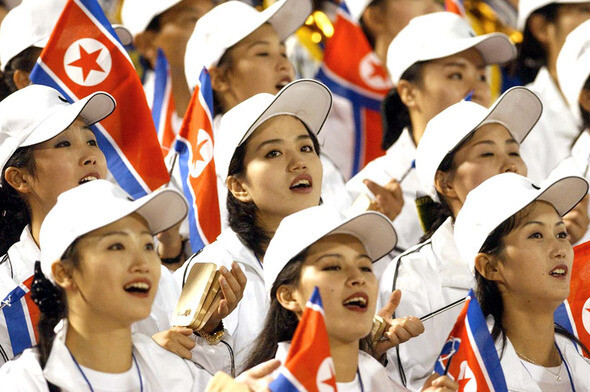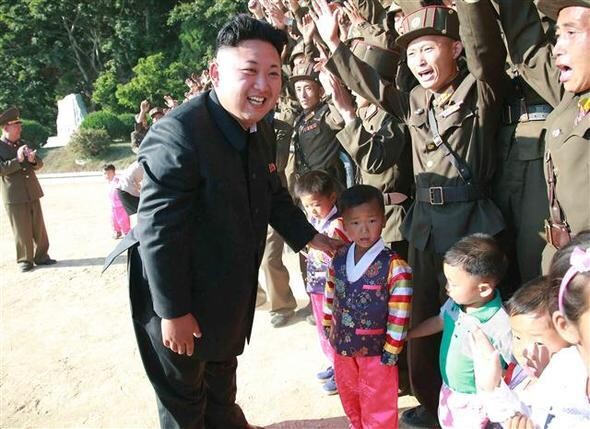hankyoreh
Links to other country sites 다른 나라 사이트 링크
[Analysis] N. Korea taking unusual steps to improve its lot

By Park Byong-su, senior staff writer and Choi Hyun-june, staff reporter
North Korea’s ongoing peace offensive to reconcile with the South are unusual. On July 7 - one week after South Korea rejected the “special proposal” offered by the North’s National Defense Commission - the North went a step further by releasing a statement from “the government of the republic” calling for a halt of hostility and conflict between North and South Korea. The North also indicated its enthusiasm about sending a cheerleading squad to the Asian Games, taking place in Incheon in September.
In the statement released on Monday, North Korea said, “it is the adamant commitment of the government of the republic to bring in an age of a new transition toward an improvement of relations between North and South and reunification of the fatherland.” In the statement, it made four proposals: sending a cheerleading squad to the Asian Games, halting war exercises that are preparation for an invasion of North Korea, abiding by the June 15 and October 4 joint declarations, and halting cooperation with other countries on the issue of North Korean nuclear weapons.
The South Korean government played down North Korea’s statement, stating that it “keeps making the same irrational claims.” Seoul’s opposition to the statement seems to derive from its judgment that the content of the statement is not significantly different from the special proposal of the National Defense Commission from June 30, which called for a “complete halt of all hostile military activity from 0:00 on July 4.”
However, Seoul accepted the North’s proposal to send a cheerleading squad. “We are planning to take all necessary preparations for the participation of North Korea’s athletes and their cheerleading squad in accordance with international practices,” the government said. On the other hand, the government firmly rejected the idea of forming a joint cheering team, saying that there are “neither plans nor precedents” for such action.
Nevertheless, if a North Korean cheerleading squad comes to the South, it would probably be necessary for there to be working-level talks between North and South Korea for this. During this process, it is likely that some progress would be made in creating an atmosphere for dialogue.
North Korea has sent a cheerleading squad to the South on three occasions, including the Asian Games that were held in Busan in Sept. 2002, as well as the 2003 Daegu Universiad and the Sept. 2005 Incheon Asian Athletics Championship. On former visits, the North Korean cheering team has included a number of attractive young women. Wherever they went, people referred to them as the “beautiful cheerleading squad,” and they played a major role in creating an atmosphere for reconciliation between North and South Korea. North Korea’s decision to send a cheerleading squad appears to also be motivated by an intense desire to improve inter-Korean relations, which have been strained recently, by using these past experiences.
The reason that this statement is attracting the most attention is because it is a “statement from the government,” the most authoritative form that a North Korean statement can take. North Korea has only issued government-level statements on a few occasions. Some of the only examples are when the North declared that it was leaving the Non-Proliferation Treaty (NPT) in March 1993 and Jan. 2003 and when it declared its comprehensive and principled intention to normalize relations with Japan in 1999. This is the first time that North Korea has issued a government statement about inter-Korean relations.
Unlike the “special proposal” by the National Defense Commission last week, this statement does not contain any detailed offers. Instead, it reaffirms the standard principles related to inter-Korean relations and urges the South Korean government to take steps to reconcile with the North.
Importantly, North Korea officially rejected Park Geun-hye’s Trust-building Process and the Dresden Declaration, declaring these to be unification by absorption, and instead suggested a federal method of unification. “For the last seventy years or so, different ideologies and systems have existed in North and South Korea. Unifying while both sides stick to their own system is tantamount to the road to war,” the North warned.
One thing that is worth pondering is the timing of the release of the statement by the North Korean government. Most significantly, North Korea’s situation in the international community is much better than in the past. First of all, on July 4, Japan withdrew some of its sanctions against the North, permitting personnel exchange with North Korea, in accordance with the May 29 Stockholm Agreement.
In addition, North Korea is strengthening economic cooperation with Russia. Last month, North Korea and Russia established an inter-governmental committee for cooperation in commerce, economy, science, and technology, and the North agreed to regard the Russian ruble as a currency for paying trade debts. In effect, North Korea is finding ways to circumvent the regime of economic sanctions led by the US.
“It appears that North Korea is taking more aggressive action, based on the confidence instilled by its improving relations with Japan and Russia,” said Chang Yong-seok, senior researcher at the Institute for Peace and Unification Studies at Seoul National University.
It is also notable that Pyongyang’s government statement was released after the conclusion of the summit between President Park Geun-hye and Chinese President Xi Jinping.
“North Korea seems to have needed to adjust its position after hearing from China about the results of the summit. While the North probably will not shut the door to dialogue with the South, it doesn’t seem inclined to beg, either. In the future, the North Korean position could become even more by-the-book and hard-lined,” said Kim Chang-soo, director of research at the Korea National Strategy Institute.

Please direct questions or comments to [english@hani.co.kr]

Editorial・opinion
![[Column] Has Korea, too, crossed the Rubicon on China? [Column] Has Korea, too, crossed the Rubicon on China?](https://flexible.img.hani.co.kr/flexible/normal/500/300/imgdb/original/2024/0419/9317135153409185.jpg) [Column] Has Korea, too, crossed the Rubicon on China?
[Column] Has Korea, too, crossed the Rubicon on China?![[Correspondent’s column] In Japan’s alliance with US, echoes of its past alliances with UK [Correspondent’s column] In Japan’s alliance with US, echoes of its past alliances with UK](https://flexible.img.hani.co.kr/flexible/normal/500/300/imgdb/original/2024/0419/2317135166563519.jpg) [Correspondent’s column] In Japan’s alliance with US, echoes of its past alliances with UK
[Correspondent’s column] In Japan’s alliance with US, echoes of its past alliances with UK- [Editorial] Does Yoon think the Korean public is wrong?
- [Editorial] As it bolsters its alliance with US, Japan must be accountable for past
- [Guest essay] Amending the Constitution is Yoon’s key to leaving office in public’s good graces
- [Editorial] 10 years on, lessons of Sewol tragedy must never be forgotten
- [Column] A death blow to Korea’s prosecutor politics
- [Correspondent’s column] The US and the end of Japanese pacifism
- [Guest essay] How Korea turned its trainee doctors into monsters
- [Guest essay] As someone who helped forge Seoul-Moscow ties, their status today troubles me
Most viewed articles
- 1[Column] The clock is ticking for Korea’s first lady
- 2After 2 months of delayed, denied medical care, Koreans worry worst may be yet to come
- 3Hong Se-hwa, voice for tolerance whose memoir of exile touched a chord, dies at 76
- 4[Column] Has Korea, too, crossed the Rubicon on China?
- 5[Correspondent’s column] In Japan’s alliance with US, echoes of its past alliances with UK
- 6Samsung barricades office as unionized workers strike for better conditions
- 7All eyes on Xiaomi after it pulls off EV that Apple couldn’t
- 8[Editorial] As it bolsters its alliance with US, Japan must be accountable for past
- 9[News analysis] After elections, prosecutorial reform will likely make legislative agenda
- 10US overtakes China as Korea’s top export market, prompting trade sanction jitters